Improving eye health and tackling inequalities
Wednesday, 5 July 2023
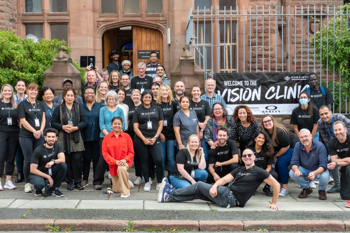
Cheshire and Merseyside Local Eye Health Network
We know that accessing eye care can be difficult for some of our most vulnerable and marginalised residents and we also know that they are often amongst those who would benefit most from these services.
Our Cheshire and Merseyside Local Eye Health Network is carrying out some pioneering work to address the differences in access that exists between our different communities and groups of residents.
So, instead of waiting for people to come to see them, our team of optometrists have been going out and about to deliver eye care directly to those who are less likely to seek help for any of their health problems.
This work is focused around four areas - services for those who attend special schools, are homeless or asylum seekers and exploring how we might improve information and support for people with sight loss.
How does this improve services for patients?
Since it began the programme has provided improved eye care to thousands of people with often life changing effects.
Sight tests in special schools
Our optometrists have been carrying out eye testing and suppling spectacles in special schools across Cheshire and Merseyside, leading to improved care for hundreds of children. By working closely with hospital services, those with complex eye conditions have been able to have their care transferred and carried out more easily and conveniently at their school rather than having to travel for appointments, which can be difficult for these patients.
Homeless eye care service
Set up around six years ago, this roving service has been going into some of the least affluent areas of Cheshire and Merseyside.
Over the last two years our optometrists have visited over 49 locations including three women’s shelters to provide eye care direct to people, supplying more than 80% of them with much needed spectacles.
Alongside eye testing, our professionals are able to spot more serious and sometimes life threatening conditions that require urgent treatment, from detached retinas and eye tumours to diabetes and severe jaundice.
Feedback has been extremely positive with many patients reporting the care they’ve received has been life changing in improving their vision, general health and confidence.
Sight tests for asylum seekers
Refugees and asylum seekers can have complex health needs that may be influenced by their experiences prior to leaving their home country and during travelling to and arriving in the UK. Once in the UK, they often find it difficult to access and register for services due to their circumstances even though they are entitled to healthcare in the same way as any other patient.
As well as working to ensure there is access to eye care in opticians close to areas where asylum seekers and refugees are living, our optometrists go out to provide sight tests directly working through the Cheshire and Merseyside Homeless service.
We have also been working with two not for profit organisations - Asylum Link Merseyside and the international organisation, OneSight - to look for other opportunities to support these patients.
Together, we ran a five day event in September 2022 in three key venues including Asylum Link’s centre and Abdullah Quillam Mosque both in Liverpool delivering sight tests and spectacles, as well as some basic health checks.
Alongside Asylum Link and OneSight, 11 clinical and support staff from Cheshire and Merseyside optometry practices volunteered their time to carry out the checks, meaning no additional cost to the NHS. We also had support from GP practice staff who joined us at the venues to register patients.
During the project nearly 550 patients had a sight test and nearly 250 were supplied with spectacles. We were also able to test people’s blood pressure and for the heart condition, atrial fibrillation (AF).
As a result, the number of asylum seekers and refugees registering with a GP practice increased and Asylum Link Merseyside continues to offer regular testing for AF and blood pressure at weekly language classes.
Improving information and support for people with sight loss
This project is initially focused on Cheshire, seeing us working jointly with one of our voluntary, community and faith sector organisations called ‘Vision Support’ to explore how we can better ensure those with sight loss have access to the information they need.
We have been able to review what was already available and look at what else might be put in place to improve the quality of life for those with sight loss. This helped us to co-design a business case with patients for a new telephone helpline service that has secured five-year funding from the National Lottery.
Sightline launches in early July 2023 and will provide dedicated support for those with sight loss, linking them to a wide range of information about local services.
What's next?
Our programme continues to look for new opportunities to provide eye care to those who experience barriers in accessing healthcare, working together with a wide range of partners across Cheshire and Merseyside, including Cheshire Local Optical Committee.
We are continually looking at new venues for our roving homeless and refugee and asylum seeker services to visit and evaluating their impact on improving care to their patients.
Once our Sightline service launches, we will be regularly assessing how well it is meeting the needs of those with sight loss, working directly with those patients to do this.
Patient stories
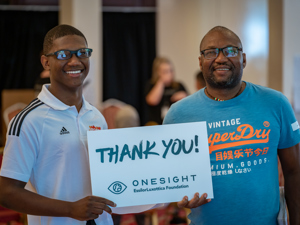
Milo and Uno's story
Father and son, Milo and Uno attended on the first day.
Uno had glasses several years ago but lost them journeying from Namibia to UK. He only has vision in one eye as a result of a hit and run accident when he was 12, which left him with neurological damage and an injured leg.
He is starting school in September and wants to be able to see well and learn lots! When asked what he likes to do and if the glasses would help, he said “I love playing chess, I’m not sure if the glasses will help but I can hope!” whilst laughing.
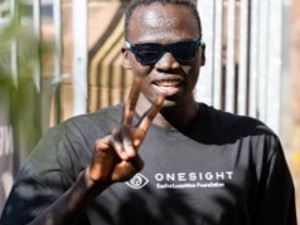
Martin's story
Martin has been travelling for two years and had only been in the UK for 29 days when he attended the clinic. At just 18 years old, he has two siblings and doesn’t know where they are, as he journeyed here alone.
He’s had quite the journey, from South Sudan to Libya to Tunis to Algeria then back to Libya again then to Italy. His boat sank when leaving Libya and had to swim four hours back to shore. When he finally arrived in Ventimiglia he walked to Nice, normally 25 miles and about 40 minutes by road, but Martin walked across countryside, over the mountains, and along the railways when the trains didn’t run. It took him 19 hours.
Martin was one of the first patients seen at the event and he returned every day as a volunteer to help with translation and keep the team amused. At 6 ft 6 ichs he was quick with the jokes aimed at some of our shorter team members.
He wants to study but is only allowed to join a basic ESOL class due to his asylum seeker status.
He was grateful for the sunglasses to protect his eyes, the opportunity to help, and the support and encouragement we gave him. He is an inspirational, charismatic young man whose positivity touched hearts in a big way!
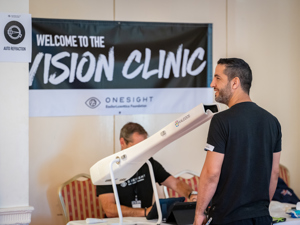
Helal's story
A chauffer in Palestine, Helal had journeyed from Gaza to Greece then Belgium, France and then finally the UK.
Imprisoned in Palestine, he was exiled on release, leaving his wife and four children there. He has never met his youngest son, as he was imprisoned when his wife was still pregnant. He hopes to be able to work soon and start the process of moving his family to the UK.
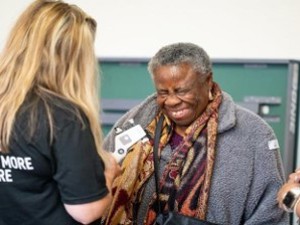
Janet's story
Janet’s smile lit up the room the minute she walked in. She left Togo 20 years ago, but still has not been granted permanent asylum in the UK.
She was emotional as she shared about her journey, and her deep sadness about never being able to return home, where her deceased son is laid to rest.
We were happy to bring her some joy with new distance and reading glasses to help her manage her presbyopia.
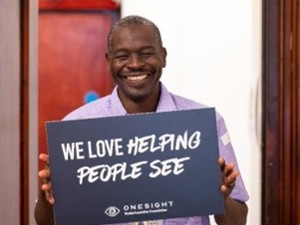
Elhadi's story
Elhadi is an Asylum Link volunteer and was a great support with translation at the event. He is an asylum seeker himself, so is unable to work in the UK.
In his native Sudan, he was a human rights activist, supporting people in Darfur and looking after Serbian refugees. “I just wanted to help and support these people,” he said gesturing to the other patients. He was 42 and had only been in the UK for 45 days.
Elhadi initially didn’t want a sight test as he lost his last pair and wanted us to help those more in need. A truly kind and selfless person.